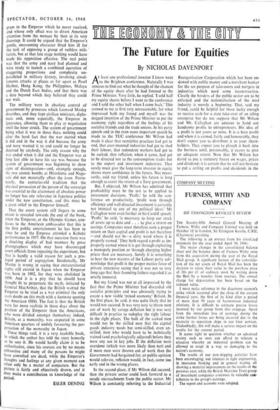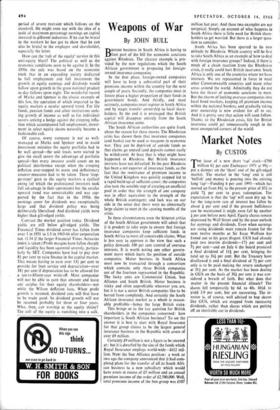The Future for Equities
Tr Au
BEACH nr 1
By NICHOLAS DAVENPORT
AT least one professional investor I know went
to the Brighton conference. Naturally I was anxious to find out what he thought of the chances of the equity share after he had listened to the Prime Minister. Very little, he replied. 'I sold half my equity shares before I went to the conference and I sold the other half when I came back.' This seemed to me at first very unreasonable, for what impressed both my friend and myself was the dogged intention of the Prime Minister to put the economy right regardless of the feelings of his socialist friends and the trade unions. In his party speech and in the even more important speech he made to the TUC conference Mr Wilson had made it clear that restrictive practices had got to end, that over-manned industries had got to shed their labour, that redundant workers had got to be sacked, that reflation, when it came, had got to be directed not to the consumption trades but to the export and investment industries. That surely must give the long-term investor in equity shares more confidence in the future. Not neces- sarily, said my friend, unless his future is long enough to cover the return of a Tory government.
But, I objected, Mr Wilson has admitted that profitability must be the test to be applied to investment decisions. `Profit,' he told the con- ference on productivity, `profit won through efficiency and well-directed investment is certainly not inimical to any of my political ideas.' Mr Callaghan went even further in his Cardiff speech. `Profit,' he said, 'is necessary to keep our stock of assets up to date and . . . to give a return on savings. Companies must therefore earn a proper return on their capital and profit is not therefore —and should not be—a dirty word where it is properly earned.' They both regard a profit as im- properly earned where it is got through exploiting a monopoly position or through charging higher prices than are necessary. Surely it is something to hear the new masters of the Labour party ack- nowledge that profit is the proper motive force of private enterprise seeing that it was not so very long ago that their founding fathers regarded it as utterly immoral.
But my friend was not at all impressed by the fact that the Prime Minister had discarded old socialist principles and was obviously trying to create a new viable 'mixed economy' Britain. In the first place, he said, it was quite likely that he would not succeed. It was very easy to throw men out of work by savage deflation but it was very difficult in practice to redeploy the right labour in the right places. The bulk of the sacked men would not be the skilled men that the capital goods industry needs but semi-skilled, even un- skilled, men who would have to be technically trained (and psychologically adjusted) before they were any use in key jobs. If the deflation were overdone (which was more likely than not) and if more men were thrown out of work than the Government had bargained for, or public opinion would tolerate, reflation would, in fact, come too early and in the wrong places.
In the second place, if Mr Wilson did succeed, then the private sector could look forward to a steady encroachment from the public sector. Mr Wilson is constantly referring to the Industrial
Reorganisation Corporation which has been en- dowed with public money and a merchant banker for the set purpose of take-overs and mergers in industries which need some reconstruction. Clearly the borders of the public sector are to be enlarged and the nationalisation of the steel industry is merely a beginning. That, said my friend, could be helpful for those lucky enough to receive cash for a state take-over of an ailing enterprise but do not suppose that Mr Wilson and Mr. Callaghan are anxious to hand out handsome profits to entrepreneurs. His idea of a profit is not yours or mine. It is a bare profit and when it is earned, fairly and honourably, they don't expect you to distribute it to your share- holders. They expect you to plough it back into the business until, presumably, it ceases to give an adequate return. Now that Mr Wilson has dared to put a statutory freeze on wages, prices and dividends it is certain that he will not hesitate to put a ceiling on profits and dividends in the
period of severe restraint which follows on the standstill. He might even toy with the idea of a scale of maximum percentage earnings on capital invested in different industries. If he can be brutal to the workers he has got to show that he can also be brutal to the employer and shareholder, especially the latter.
How can the 'cult of the equity' survive in this anti-equity blast? The political as well as the economic conditions seem to be against it. In the 1950s the cult was based on the economic truth that in an expanding society dedicated to full employment and full investment the growth in equity earnings and dividends would follow upon growth in the gross national product as day follows upon night. The wonderful record of Marks and Spencer is the classic example of this law, the operation of which imparted to the equity markets a secular upward trend. For life funds, pension funds and other institutions seek- ing growth of income as well as for individual savers seeking a hedge against the creeping infla- tion which accompanied full employment, invest- ment in select equity shares naturally became a fashionable cult.
Of course, every company is not as well- managed as Marks and Spencer and to avoid investment mistakes the equity portfolio had to be well spread—the unit trusts were started to give the small savers the advantage of portfolio spread—but every investor could count on no political interference except when the creeping inflation over-stepped its norm and deflationary counter-measures had to be taken. These 'stop- go-stops' gave to the equity markets a cyclical swing (of which the professional investors took full advantage in their operations) but the secular upward trend was unmistakable and was sup- ported by the fact that in the 1950s the earnings cover for dividends was exceptionally large and that dividend policy was being deliberately liberalised. And dividend yields were higher than gilt-edged yields.
Contrast the market position today. Dividend yields are still below gilt-edged yields. The Financial Times dividend cover has fallen from over 3 in 1951 to 1.5 in 1965-66 after corporation tax. (1.34 if the larger Financial Times Actuaries index is taken.) Profit margins have fallen sharply and liquidity has been squeezed severely, particu- larly by SET. Companies have had to pay over 8f per cent to raise finance in the capital market. This means having to earn over 131 per cent to provide for loan service and depreciation—over 18+ per cent if depreciation has to be allowed for a ten-to-fifteen-year write-off. Most companies will not be able to earn that amount and leave any surplus for their equity shareholders—not while the Wilson deflation lasts. When profit growth is resumed, dividend cuts will first have to be made good. So dividend growth will not be resumed probably for three or four years. Who, then, can worship at the equity shrine? The cult of the equity is vanishing into a sulk.







































 Previous page
Previous page